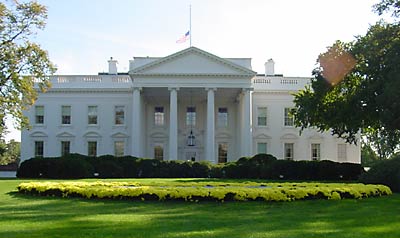Where’s the Space Council?by Dwayne Day
|
| We don’t know why the Obama administration has not recreated the space council, although it is clear that this is one promise that has no penalties for breaking. |
So here we are, eleven months into the Obama administration, and you’ll notice that this has not happened yet. In fact, several major space policy reviews are underway in Washington, including a review of ITAR and a national space policy review being conducted by the National Security Council (NSC). And yet nobody in the executive branch has mentioned the possibility of recreating the space council to handle things like this. Why?
In summer 2008, the trade newspaper Space News ran several op-eds both for and against the creation of a space council. The pro-side was represented by Mark Albrecht, who served as the executive director of the space council during part of the George H.W. Bush administration. Albrecht’s arguments were the common ones made by advocates of a space council: primarily that it would provide a forum for coordinating national space policy and bringing together actors such as NASA, DoD, Commerce, and NOAA that do not often communicate or cooperate effectively.
The against argument was made by Alan Ladwig, a former NASA official who is now back at the agency. Ladwig’s argument was more complex and somewhat surprising. Ladwig suggested that a space council might be a bad idea because it could result in space issues being balkanized to a forum that White House policy makers could ignore. With space policy issues handled by the National Security Council, they are treated with some importance, because the NSC is well-recognized within the executive branch and wields influence. Washington power players would ignore a space council, but cannot ignore the NSC.
We don’t know why the Obama administration has not recreated the space council, although it is clear that this is one promise that has no penalties for breaking. One possible explanation is that the White House has been preoccupied with bigger issues, such as the economy, dual wars, and health care legislation. Another possible explanation is that the creation of the Augustine committee in the spring removed some of the justification for recreating the space council, although the committee was directed only to provide options, not recommendations, leaving the task of actually deciding upon a course of action to somebody else in the executive branch.
| The most likely reason the Obama administration has not recreated the space council is the inherent contradiction in the idea of a space council. |
Yet another possible explanation is that the new administration took a look at previous space councils and decided that they didn’t do much, and what little they did was not always good. The space council was unimportant or ignored during the Eisenhower, Johnson, and Nixon administrations (a period of about 11 years) and only had some influence or importance during a few points during the Kennedy and Bush-1 administrations. Under Kennedy, the council was involved in the Apollo decision and the establishment of Comsat. But the Bush experience was not exactly positive: the space council’s most notable achievement then was pushing the new president to embrace the Space Exploration Initiative, which promptly imploded within a year. In 52 years of American spaceflight, a space council has only played an important role during about three or four of them.
But the most likely reason the Obama administration has not recreated the space council is the inherent contradiction in the idea of a space council. Space council advocates want a space council in order to elevate civil space policy within the White House and increase the likelihood that civil space issues will be considered by the president. In other words, to lobby the president on behalf of civil space. And the last thing that presidents, or their senior advisors, want is yet another actor trying to exert influence on the president and make demands on his time. One of the most overlooked aspects of any presidency is how the White House chief of staff controls access to the president. White Houses that have allowed too many people and issues to reach the president have never been very effective. They don’t want the lobbyists working in the West Wing.
The simplest answer for why there is no space council may be the most bland: because Obama doesn’t want one.
